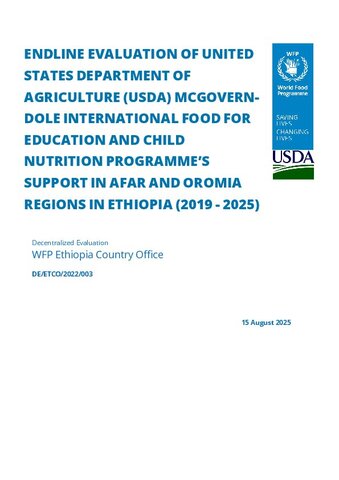
The endline evaluation of the World Food Programme’s McGovern-Dole (MGD) funded school feeding initiative in Ethiopia (2019–2025) highlights significant strides in improving educational access, nutrition, and community engagement across targeted regions. Implemented in partnership with the Ministry of Education and regional bureaus, the programme reached over 260,000 children in more than 600 schools, primarily in Oromia and Somali regions, with daily school meals and complementary literacy and health interventions.
Key achievements:
- School attendance rose markedly, with enrolment increasing by 10 percentage points and dropout rates declining.
- Literacy outcomes improved, especially among early grade learners, supported by teacher training and provision of reading materials.
- Nutrition indicators showed positive trends, with reduced short-term hunger and improved dietary diversity among students.
- Community ownership was strengthened through capacity building of Parent-Teacher Associations and school committees.
Challenges and lessons:
Despite notable gains, the evaluation identified persistent barriers including infrastructure gaps, limited water access, and inconsistent supply chains. Literacy gains were uneven across regions, and gender disparities in attendance remain a concern. The COVID-19 pandemic disrupted learning and service delivery, underscoring the need for adaptive programming and contingency planning.
Evaluation approach:
The mixed-methods evaluation employed household surveys, school-level assessments, and qualitative interviews with stakeholders. It benchmarked progress against baseline data and MGD performance indicators, offering a robust picture of outcomes and implementation fidelity.
Recommendations: To sustain and scale impact, the evaluation recommends:
- Strengthening local procurement and supply chain systems.
- Enhancing coordination between education and health sectors.
- Expanding literacy support, especially in underserved areas.
- Institutionalizing school feeding within national policy frameworks.
The WFP Ethiopia MGD programme demonstrates how integrated school feeding can catalyze educational and nutritional gains in food-insecure contexts. Continued investment, cross-sectoral collaboration, and community engagement are vital to building resilient, inclusive systems that support children’s learning and well-being.
| Document | File |
|---|---|
| Endline evaluation brief |
PDF | 270.72 KB
Download
|
| Endline evaluation management response |
PDF | 299.2 KB
Download
|
| Endline terms of reference |
PDF | 711.91 KB
Download
|
| Mid-term evaluation report Volume I |
PDF | 5.64 MB
Download
|
| Mid-term evaluation report Volume II - Annexes |
PDF | 2.51 MB
Download
|
